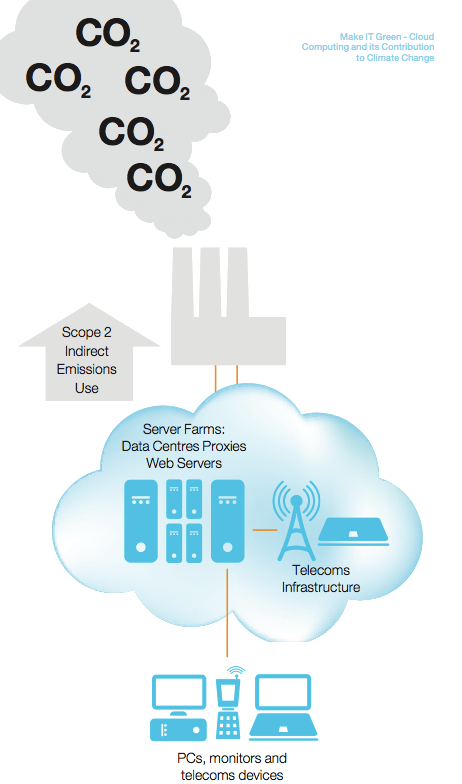The new report from Greenpeace issued this week claims that "quintessential cloud computing devices," like Apple's iPad, raise questions about how the Internet is powered. Specifically, the nongovernmental organization said increase demand for online services will also result in a larger demand for "dirty coal power."
"To be clear: We are not picking on Apple," the group said. "We are not dissing the iPad. But maybe someone can come up with an app that calculates the carbon footprint of using different web sites based on their location and energy deals.
"Apple is the master of promotion, and while we marvel at the sleek unpolluted design of the iPad, we need to think about where this is all leading and how like all good surfers we can make sure our environment stays clean and green."
The report, entitled "Make IT Green: Cloud Computing and its Contribution to Climate Change," concludes that connected mobile devices like the iPad will increase the use of online services like social networks and video streaming. The report noted that Facebook recently announced the construction of its own data center in Prineville, Oregon that will primarily run on coal.
The report states that data centers and telecommunication networks will consume about 1,963 billion kilowatt hours of electricity in 2020, which is more than triple their current consumption and over half of the total electricity consumption in America. Devices like the iPad, the environmental group suggests, will only add to global warming pollution.
"As the cloud grows, the IT industry's appetite for energy will only increase, so the industry must become strong advocates for renewable energy solutions and strong laws that cut global warming pollution," said Casey Harrell, Greenpeace International campaigner. "IT companies like Microsoft, Google, and IBM are now in powerful positions at the local, national, and international levels to influence policies that will allow them to grow responsibly in a way that will decouple their economic growth from rising greenhouse gas emissions."
When Apple introduced the iPad in January, it touted the environmental checklist for the construction of the new hardware. The company noted that the device is free of arsenic, brominated flame retardant, mercury, polyvinyl chloride, and is highly recyclable.
Greenpeace's attitude toward Apple has improved significantly over the last few years, with the environmental group ranking the Mac maker the greenest electronics maker earlier this year. The praise was quite a change from just a few years ago, when Greenpeace was targeting Apple over the use of toxic chemicals in its products.
Last Year, Apple co-founder Steve Jobs revealed that Greenpeace's actions played a part in his company eventually promoting its green focus in public. He said the company's tight-lipped approach, particularly on public policy issues, hurt its image with environmental organizations.
Last September, Apple began reporting its hardware carbon emissions, and touting its environmentally friendly hardware. The Cupertino, Calif., company said less than 5 percent of its emissions come from manufacturing facilities, while more than 95 percent of Apple's greenhouse gases are from use of the products they make.
 Sam Oliver
Sam Oliver







-m.jpg)






 Marko Zivkovic
Marko Zivkovic

 Malcolm Owen
Malcolm Owen

 Amber Neely
Amber Neely

 Wesley Hilliard
Wesley Hilliard









147 Comments
(And I don't mean Toshiba!) I'm an avid greeny, but this sort of comment is yet more in the armoury of those who find the movement lacking in credibility. The solution to the world's woes is NOT energy saving (too complicated, impractical and expensive), but in fact to switch to renewable sustainable sources - such as solar, where it doesn't really matter how much we use. The aim should be to source energy that is clean and uncorrupt.
I shall be ordering our iPad and focusing my energies on promoting solar energy as the way forward by using it to update a forthcoming blog and eShop at LifeMachine.com. No plug intended.
Oh well. Bothered.
I think the right way to look at this is to see the emergence of "the cloud" as a great opportunity to improve the environmental impact of computing relative to a model in which all of the computing power lies with the client. Far easier to influence how power is generated for a single, centrally located server than to influence how power is generated for a million geographically dispersed clients. For example, it's easier to get google to install solar panels on the roof of their giant data center than to get every individual who uses that data center to install solar panels.
I think the right way to look at this is to see the emergence of "the cloud" as a great opportunity to improve the environmental impact of computing relative to a model in which all of the computing power lies with the client. Far easier to influence how power is generated for a single, centrally located server than to influence how power is generated for a million geographically dispersed clients. For example, it's easier to get google to install solar panels on the roof of their giant data center than to get every individual who uses that data center to install solar panels.
I totally agree. It should be much more easy to power a large data centre by 'green energy' as for example powering cars - probably a much worse pollutant than the iPad. Maybe doing some things on the go using the internet prevents people from using their car and go somewhere to do it ...?
(And I don't mean Toshiba!) I'm an avid greeny, but this sort of comment is yet more in the armoury of those who find the movement lacking in credibility. The solution to the world's woes is NOT energy saving (too complicated, impractical and expensive), but in fact to switch to renewable sustainable sources - such as solar, where it doesn't really matter how much we use. The aim should be to source energy that is clean and uncorrupt.
Hmm... I almost agree with you. I think the problem with groups like Greenpeace is that they appear to be suggesting that they would prefer that economic growth be halted or reversed. Whenever they complain about any specific economic activity, it always sounds like they just want the activity stopped, not that they want it to be done more efficiently or using greener energy sources. That line of argument is anti-progress, anti-human, and isn't going to convince anyone.
But I don't agree that making efforts to save energy are too complicated, expensive, or impractical. In fact, in many cases, saving energy is less complicated, less expensive, and more practical than alternative energy sources. For example, there are a lot of drafty houses out there that could save a lot of energy through adding better windows or insulation. I'm all for alternative energy sources, but energy efficiency is also important and useful.